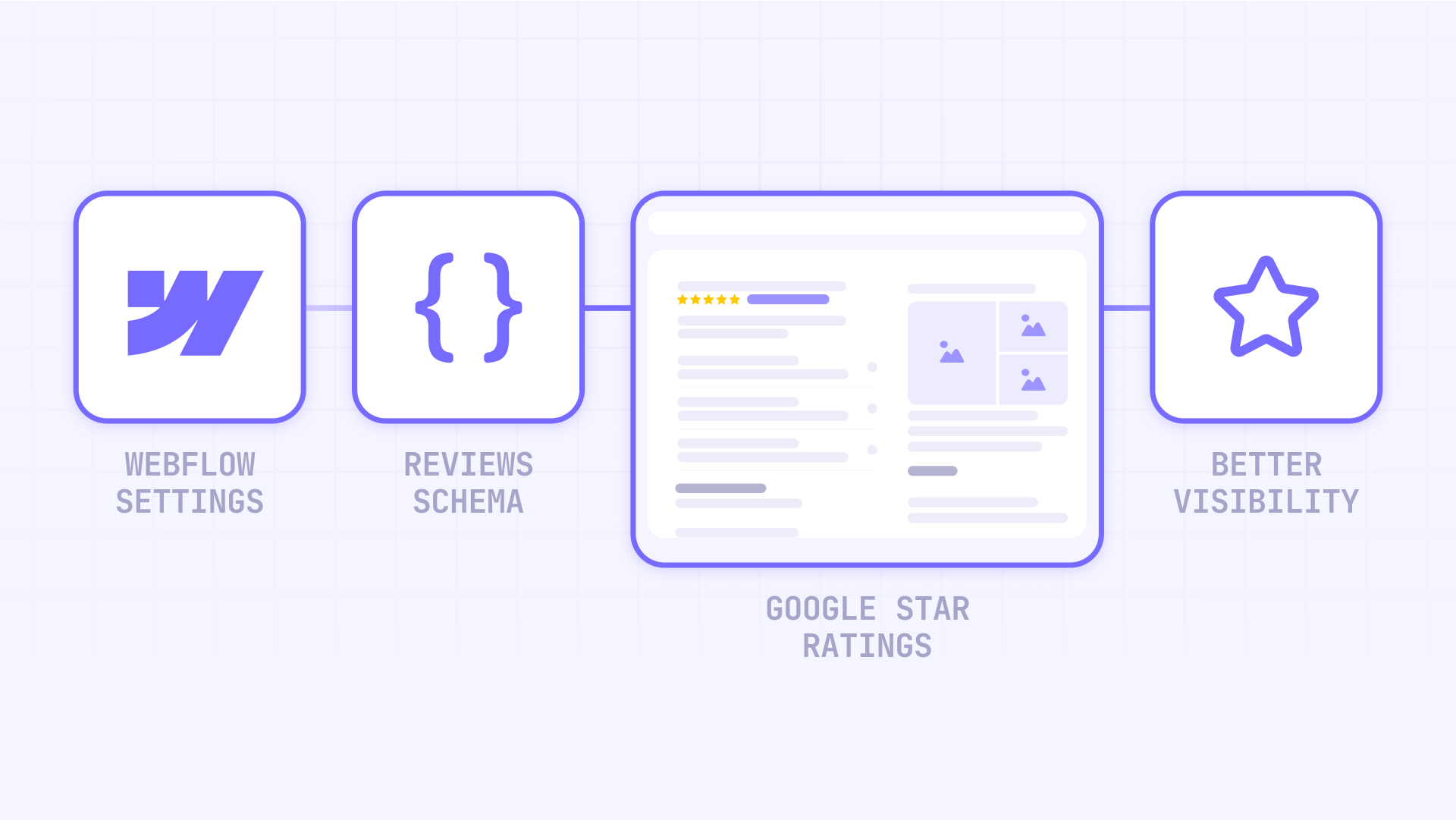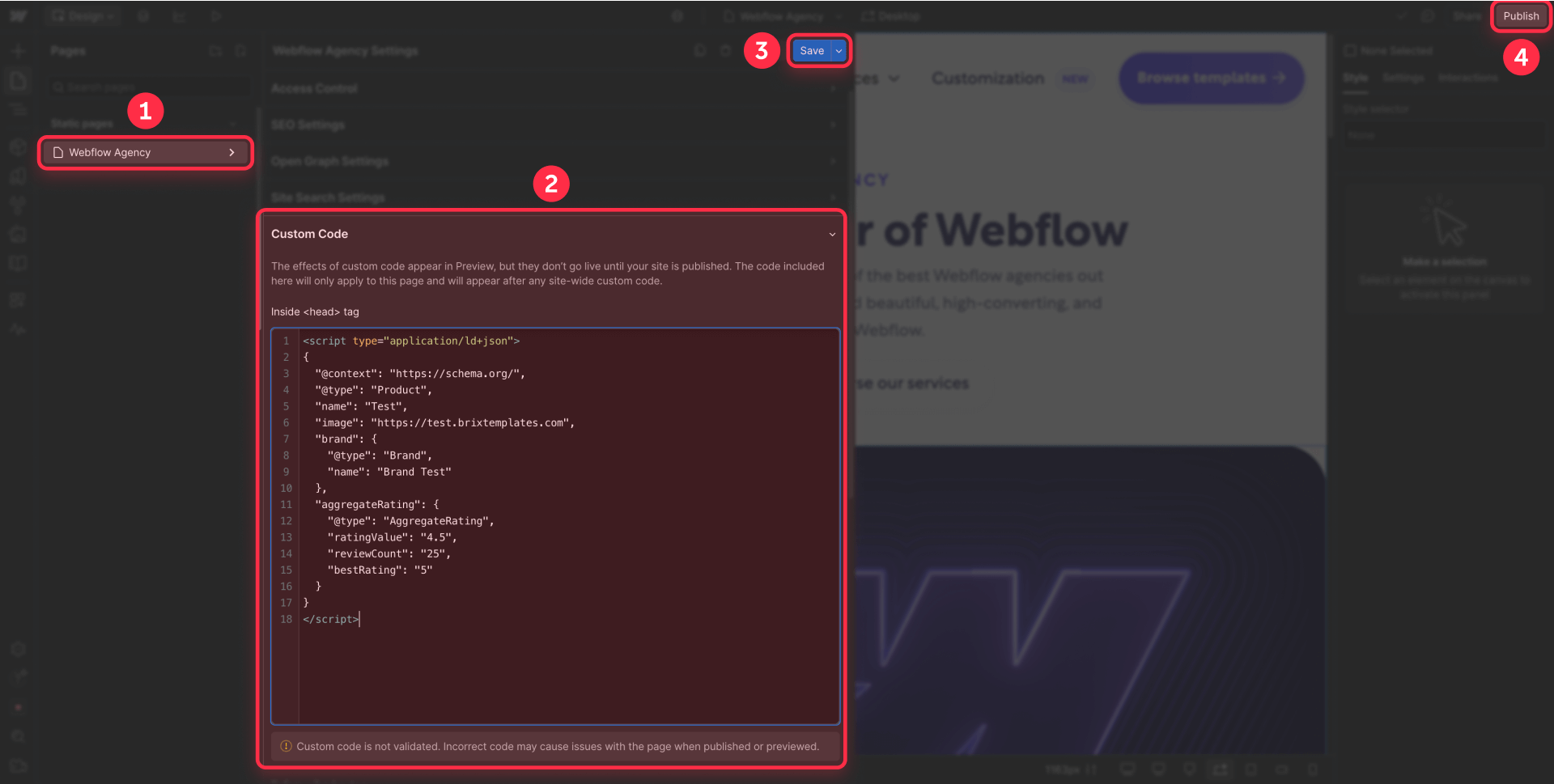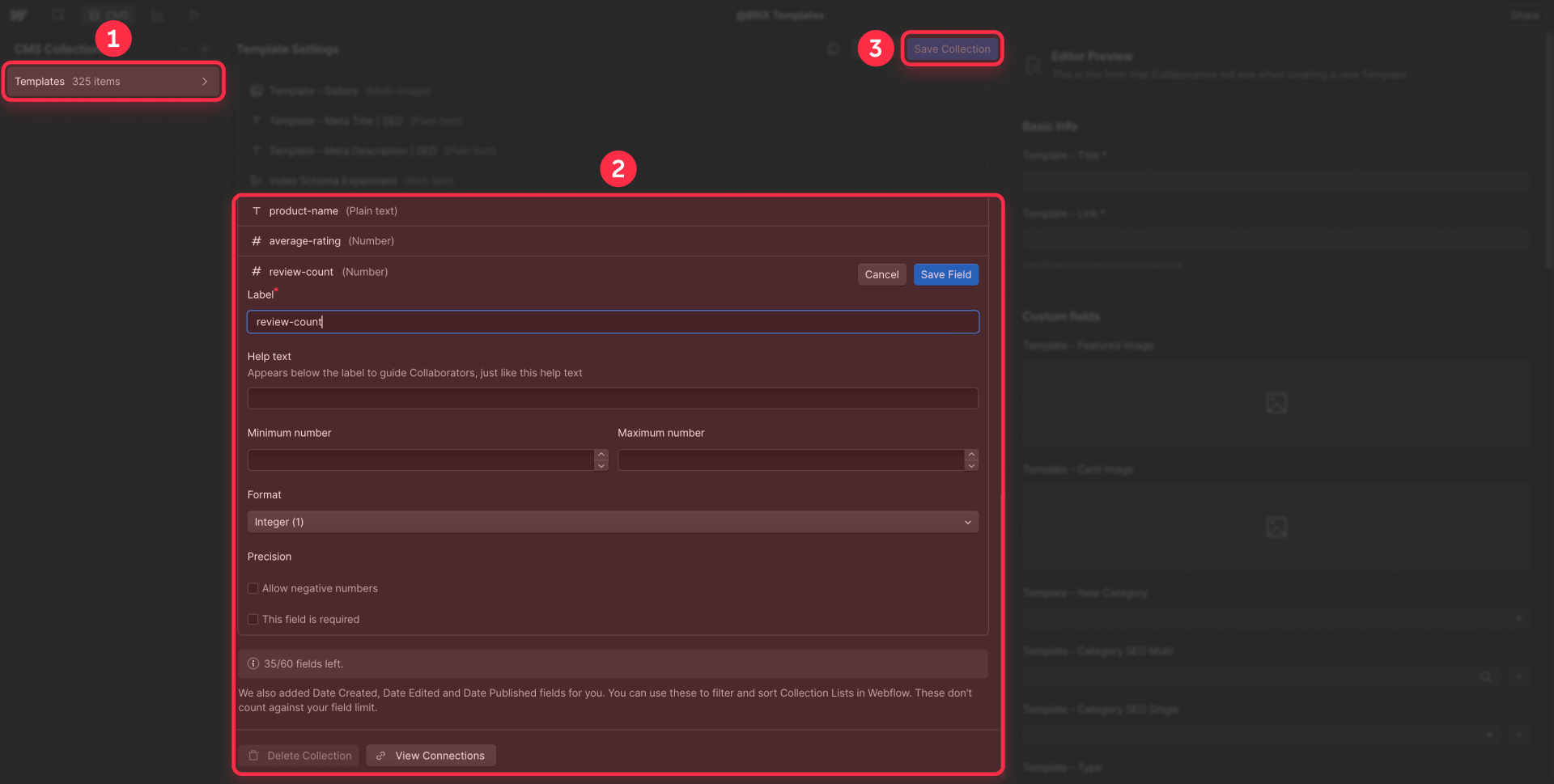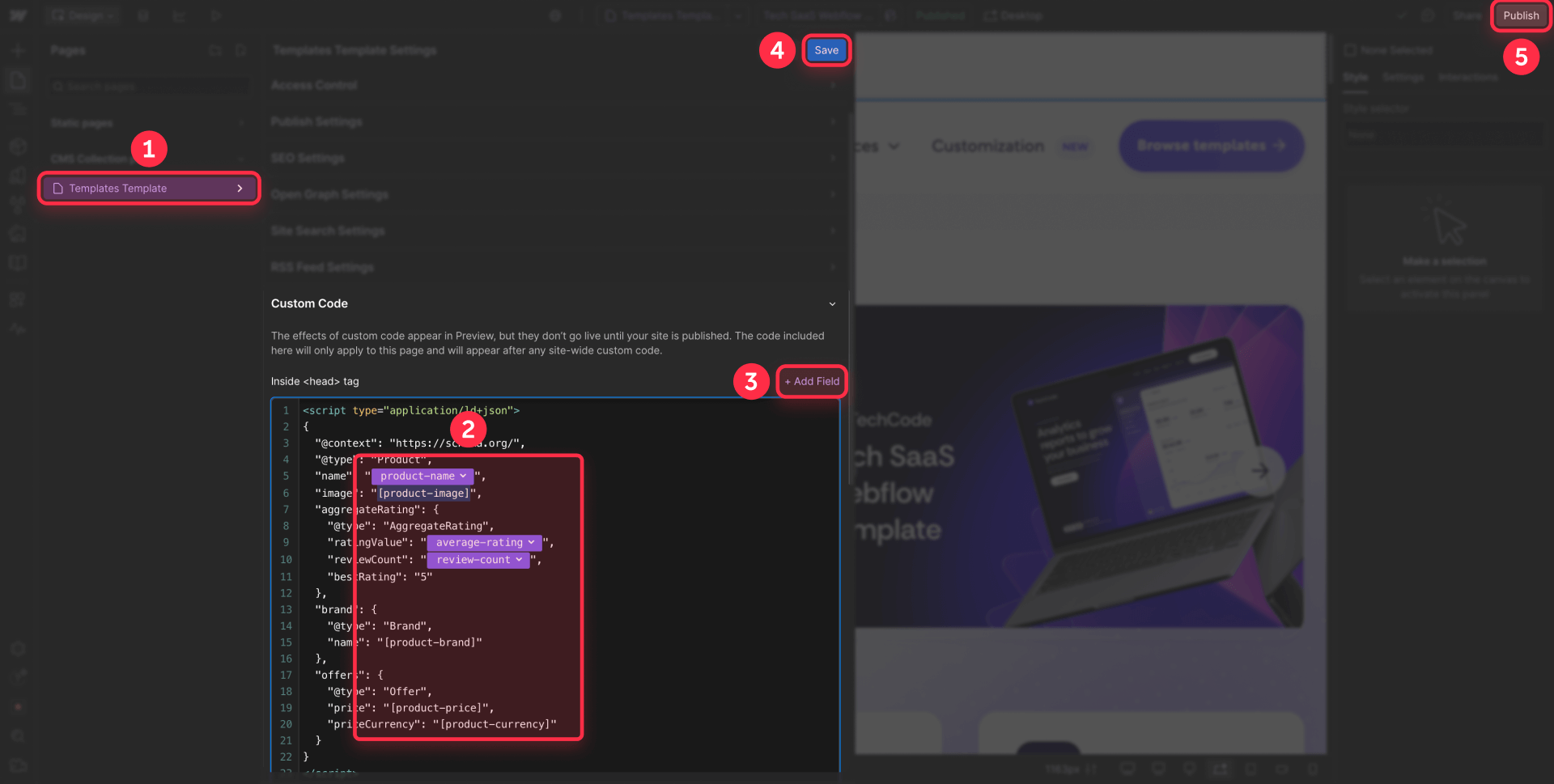How to add review Schema to your Webflow site: Complete guide


If you're looking to add review Schema to your Webflow site to display star ratings in Google search results, this guide will show you exactly how to do it. You'll learn two implementation methods: one for static pages and another for CMS Collections.
We'll use a free automatic generator that simplifies the entire process, eliminating the need to write complex JSON-LD code manually.

What is review Schema and how it works in Webflow
Review Schema is structured code (JSON-LD) that tells Google exactly where the reviews are on your page and what information they contain. When properly implemented, Google can display golden star ratings and review scores directly in search results, which can significantly increase click-through rates to your site.
A common implementation error: Review Schema should always go in Page Settings > Custom Code > Inside head tag for each specific page, never in global Site Settings. Placing it in Site Settings will cause Google to either ignore your Schema or generate errors across all pages.
Important note: Implementing Schema correctly makes you eligible for rich results, but Google decides when to display them based on factors like site authority, content quality, and search relevance.
Automatic review Schema generator for Webflow
To simplify code creation without manually writing JSON-LD, here's our free tool that generates optimized review Schema.
Review Schema generator tool
This tool generates ready-to-use review Schema code for Webflow. The process is straightforward:
1 - Select your implementation type:
- Static: For pages with fixed reviews that you add manually
- Dynamic with CMS: For use with Collections where reviews come from CMS fields
2 - Choose your Schema type based on your content:
- Product: For physical or digital products (most reliable for star ratings)
- Service: For professional services
- SoftwareApplication: For apps and software
- LocalBusiness: Has restrictions since 2019 (Google doesn't display self-serving reviews)
3 - Specify how many individual reviews you want to include (in addition to the aggregate rating)
4 - Fill in the fields:
- For static: Enter your data directly
- For dynamic: The generator will create placeholders that you'll connect to CMS fields
5 - Copy the generated code with one click
The generator automatically validates your content, escapes special characters, and prevents common syntax errors.
1 - Implementation for static pages in Webflow
This method is ideal when you have few pages with reviews or when reviews don't change frequently.
Steps to implement static Schema in Webflow
Following these steps will add review Schema to any static page on your Webflow site.
1 - Generate your code using the generator with the "Static" option
2 - Open your page in Webflow Designer
3 - Click Page Settings (gear icon)
4 - Go to the Custom Code tab
5 - Paste the code in **Inside tag**
6 - Click Save and publish your site

Note about displaying individual reviews: If you want to include specific individual reviews in your Schema (beyond just the aggregate rating), Google requires those reviews to be visible on the same page. You can add a reviews or testimonial section that displays the same reviews you reference in your Schema code. This requirement only applies if you're showing specific individual reviews - the aggregate rating alone doesn't need visible reviews on the page.
Example of generated static code for Webflow
<script type="application/ld+json">
{
"@context": "https://schema.org/",
"@type": "Product",
"name": "Your Product Name",
"image": "https://yoursite.com/image.jpg",
"aggregateRating": {
"@type": "AggregateRating",
"ratingValue": "4.8",
"reviewCount": "47"
},
"review": [{
"@type": "Review",
"author": {
"@type": "Person",
"name": "John Smith"
},
"reviewRating": {
"@type": "Rating",
"ratingValue": "5"
},
"reviewBody": "Excellent product, highly recommend."
}]
}
</script>2 - Dynamic implementation with Webflow CMS
For sites with multiple products or services in Collections, dynamic implementation is more efficient. Important: Not all elements need to be dynamic - you can mix static content with CMS fields.
Preparing CMS fields in Webflow
In your Collection, create ONLY the fields that actually need to be dynamic:
Typical fields for products:
- product-name (Plain Text) - Product name
- average-rating (Number) - Average rating score
- review-count (Number) - Total number of reviews
Optional fields for individual reviews:
- review-author-1 (Plain Text) - Only if you want to display specific reviews
- review-rating-1 (Number)
- review-text-1 (Plain Text)
Reminder: Elements like @type: "Product" can remain static in your code. Only the data that changes between pages needs to be dynamic.

Implementation in Webflow Collection Template
Setting up review Schema in your Collection Template allows automatic Schema generation for all items.
1 - Go to your Collection Template in Pages
2 - Click Settings (gear icon)
3 - In Custom Code, find the **Inside tag** section
4 - Paste the code from the generator
5 - Use the + Add Field button to connect CMS fields where you see Add Dynamic Field
6 - Click Save and publish

Validating your Webflow review Schema with Google
After implementing your Schema, validate it using Google's tools:
1 - Go to https://search.google.com/test/rich-results
2 - Enter your published URL (doesn't work with Webflow preview)
3 - Review the results:
- Green: Correct implementation
- Red: Errors you must fix
- Yellow: Optional warnings
Google typically takes 1-4 weeks to process and potentially display rich results in search.
Troubleshooting common Webflow review Schema issues
Schema doesn't appear in the test: Make sure you've published your site. Custom code doesn't work in preview mode.
Empty CMS fields: Only fields you use in your Schema need values. If a field is in the code but empty, it will cause errors.
Unescaped quotation marks: The generator handles this automatically, but if you edit manually, use " for quotes inside text.
Google doesn't show star ratings: Even with valid Schema, Google decides when to display rich results based on multiple factors including site authority and content quality.
Schema appears on wrong pages: Remember that Schema must be page-specific. Never place product review Schema in global Site Settings.
Frequently asked questions about review Schema in Webflow
Can I use reviews from other platforms in my Webflow Schema?
No, Google requires that reviews in your Schema be visible on your own page. Reviews must be hosted on your site, not imported solely for Schema purposes. If you display reviews from platforms like Trustpilot or Google Reviews on your page, you can include them in your Schema - but they must be visible to users, not hidden.
What type of Schema works best for products in Webflow?
Product Schema is the most reliable for displaying star ratings in search results. Service Schema works well for professional services. Avoid LocalBusiness for self-hosted reviews due to Google restrictions implemented in 2019 that prevent businesses from showing star ratings for reviews they host themselves.
Do I need to fill all CMS fields for dynamic Schema in Webflow?
Only the fields you actually use in your Schema markup. You can mix static elements (like the Schema type) with dynamic fields (like product name and ratings). This flexibility lets you keep your CMS structure simple while still generating proper Schema for each page.
How many individual reviews should I include in Webflow Schema?
The aggregate rating (aggregateRating) is most important for star displays. Including 1-3 detailed individual reviews is sufficient - more than that can be excessive and doesn't improve your chances of getting rich results. Focus on quality over quantity.
Can the same Schema be used on multiple Webflow pages?
No, each page needs unique Schema that corresponds to its specific content. Duplicating identical Schema across pages can cause Google to ignore it or flag it as spam. The goal is for the reviews to be specific to that particular page or product, which is why repeating the same review data across multiple pages doesn't work well and defeats the purpose of providing relevant, page-specific information to search engines.
How does review Schema affect LocalBusiness in Webflow?
Since 2019, Google doesn't display rich results for LocalBusiness entities that rate themselves. Instead, use Product or Service Schema for your specific offerings rather than the business itself. This approach is more likely to earn star ratings in search results.
Does review Schema work with multi-language Webflow sites?
Yes, but each language version needs its own translated Schema. The Schema language must match the page content for each localization. Set up separate Schema code in each language version's page settings for proper implementation.
Do I need to update Schema when I get new reviews in Webflow?
For static implementation, yes - you'll need to manually update the aggregate rating and review count. That's why dynamic implementation with CMS is more practical for sites with frequent reviews. With CMS, your Schema updates automatically when you add new review data to your Collection items.
What happens if my Webflow Schema has errors?
Google will either ignore the Schema entirely or display warnings in Search Console. Use the Rich Results Test tool before publishing to catch errors early. Common issues include missing required fields, incorrect data types, and improperly formatted JSON.
Can I add review Schema to Webflow landing pages?
Yes, as long as the landing page displays actual reviews and review data. Each landing page needs its own Schema implementation in Page Settings > Custom Code. Don't use template Schema across different landing pages - customize it for each page's specific content and reviews.
Conclusion
Implementing review Schema in Webflow is a straightforward process that can significantly improve how your site appears in search results. With the automatic generator included in this guide, you can create valid code in minutes without deep technical knowledge.
Remember that proper Schema makes you eligible for rich results, but Google makes the final decision about when to display them. The key is implementing it correctly, keeping reviews updated and visible on your site, and being patient while Google processes the changes.
If you need assistance with more complex implementations or have specific questions about Schema markup, the team at BRIX Templates can help you with your Webflow project.

How to add Schema breadcrumbs in Webflow: Complete implementation guide
Implement breadcrumb Schema in Webflow without code. Guide with static/dynamic methods and Google validation

How to add FAQ Schema to your Webflow site: Complete guide
Add FAQ structured data to your Webflow site in minutes. Step-by-step guide with automatic code generator for better search visibility

Wildcard redirects in Framer: The complete guide
Learn how to implement 301 redirects and wildcards in Framer to preserve SEO value and fix broken links during site migrations












